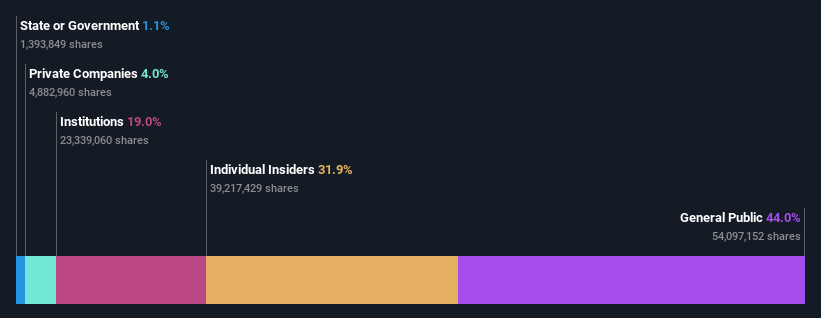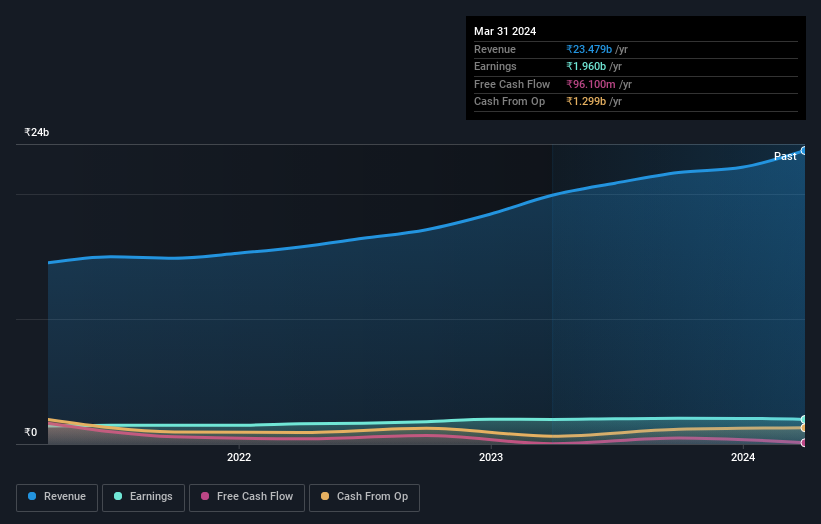- India
- /
- Commercial Services
- /
- NSEI:IONEXCHANG
Retail investors among Ion Exchange (India) Limited's (NSE:IONEXCHANG) largest stockholders and were hit after last week's 7.1% price drop

Key Insights
- Ion Exchange (India)'s significant retail investors ownership suggests that the key decisions are influenced by shareholders from the larger public
- The top 16 shareholders own 50% of the company
- Insiders have sold recently
A look at the shareholders of Ion Exchange (India) Limited (NSE:IONEXCHANG) can tell us which group is most powerful. With 44% stake, retail investors possess the maximum shares in the company. Put another way, the group faces the maximum upside potential (or downside risk).
While the holdings of retail investors took a hit after last week’s 7.1% price drop, insiders with their 32% also suffered.
In the chart below, we zoom in on the different ownership groups of Ion Exchange (India).
View our latest analysis for Ion Exchange (India)

What Does The Institutional Ownership Tell Us About Ion Exchange (India)?
Institutional investors commonly compare their own returns to the returns of a commonly followed index. So they generally do consider buying larger companies that are included in the relevant benchmark index.
We can see that Ion Exchange (India) does have institutional investors; and they hold a good portion of the company's stock. This can indicate that the company has a certain degree of credibility in the investment community. However, it is best to be wary of relying on the supposed validation that comes with institutional investors. They too, get it wrong sometimes. When multiple institutions own a stock, there's always a risk that they are in a 'crowded trade'. When such a trade goes wrong, multiple parties may compete to sell stock fast. This risk is higher in a company without a history of growth. You can see Ion Exchange (India)'s historic earnings and revenue below, but keep in mind there's always more to the story.

Hedge funds don't have many shares in Ion Exchange (India). Our data suggests that Rajesh Sharma, who is also the company's Top Key Executive, holds the most number of shares at 7.6%. When an insider holds a sizeable amount of a company's stock, investors consider it as a positive sign because it suggests that insiders are willing to have their wealth tied up in the future of the company. Nippon Life India Asset Management Limited is the second largest shareholder owning 6.2% of common stock, and Mahabir Patni holds about 5.7% of the company stock. Interestingly, the third-largest shareholder, Mahabir Patni is also a Member of the Board of Directors, again, indicating strong insider ownership amongst the company's top shareholders.
A closer look at our ownership figures suggests that the top 16 shareholders have a combined ownership of 50% implying that no single shareholder has a majority.
Researching institutional ownership is a good way to gauge and filter a stock's expected performance. The same can be achieved by studying analyst sentiments. We're not picking up on any analyst coverage of the stock at the moment, so the company is unlikely to be widely held.
Insider Ownership Of Ion Exchange (India)
The definition of company insiders can be subjective and does vary between jurisdictions. Our data reflects individual insiders, capturing board members at the very least. Company management run the business, but the CEO will answer to the board, even if he or she is a member of it.
I generally consider insider ownership to be a good thing. However, on some occasions it makes it more difficult for other shareholders to hold the board accountable for decisions.
It seems insiders own a significant proportion of Ion Exchange (India) Limited. Insiders have a ₹24b stake in this ₹76b business. We would say this shows alignment with shareholders, but it is worth noting that the company is still quite small; some insiders may have founded the business. You can click here to see if those insiders have been buying or selling.
General Public Ownership
The general public-- including retail investors -- own 44% stake in the company, and hence can't easily be ignored. While this size of ownership may not be enough to sway a policy decision in their favour, they can still make a collective impact on company policies.
Private Company Ownership
We can see that Private Companies own 4.0%, of the shares on issue. Private companies may be related parties. Sometimes insiders have an interest in a public company through a holding in a private company, rather than in their own capacity as an individual. While it's hard to draw any broad stroke conclusions, it is worth noting as an area for further research.
Next Steps:
It's always worth thinking about the different groups who own shares in a company. But to understand Ion Exchange (India) better, we need to consider many other factors. For instance, we've identified 2 warning signs for Ion Exchange (India) (1 doesn't sit too well with us) that you should be aware of.
Of course, you might find a fantastic investment by looking elsewhere. So take a peek at this free list of interesting companies.
NB: Figures in this article are calculated using data from the last twelve months, which refer to the 12-month period ending on the last date of the month the financial statement is dated. This may not be consistent with full year annual report figures.
New: AI Stock Screener & Alerts
Our new AI Stock Screener scans the market every day to uncover opportunities.
• Dividend Powerhouses (3%+ Yield)
• Undervalued Small Caps with Insider Buying
• High growth Tech and AI Companies
Or build your own from over 50 metrics.
Have feedback on this article? Concerned about the content? Get in touch with us directly. Alternatively, email editorial-team (at) simplywallst.com.
This article by Simply Wall St is general in nature. We provide commentary based on historical data and analyst forecasts only using an unbiased methodology and our articles are not intended to be financial advice. It does not constitute a recommendation to buy or sell any stock, and does not take account of your objectives, or your financial situation. We aim to bring you long-term focused analysis driven by fundamental data. Note that our analysis may not factor in the latest price-sensitive company announcements or qualitative material. Simply Wall St has no position in any stocks mentioned.
Have feedback on this article? Concerned about the content? Get in touch with us directly. Alternatively, email editorial-team@simplywallst.com
About NSEI:IONEXCHANG
Ion Exchange (India)
Provides water and environment management solutions in India and internationally.
Excellent balance sheet second-rate dividend payer.
Similar Companies
Market Insights
Community Narratives



